Related Research Articles

The predominant religion in Brazil is Christianity, with Catholicism being its largest denomination.

Adamantina is a municipality in the state of São Paulo, Brazil. The population is 35,111 in an area of 412.0 km2.

Praia Grande is a municipality in the Baixada Santista Metropolitan Region, on the southern coast of the Brazilian state of São Paulo. It is part of the Immediate Region of Santos and its population measured in the IBGE census review in 2010 was 262,051 inhabitants. In the 2022 IBGE census, the population of Praia Grande was 349,935 inhabitants, being the city in Baixada Santista that grew the most in the period 2010-2022. It is the second most populous city on the coast of São Paulo, after only Santos. With an area of 149.652 km², the population density in 2022 was 2,338.32 inhabitants/km². The municipality is formed by the headquarters and the district of Solemar.
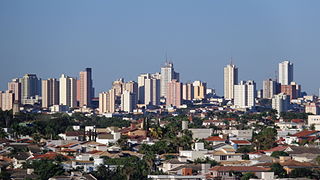
Presidente Prudente is a city (município) in the state of São Paulo, Brazil. The city has a population of 230,371 inhabitants (IBGE/2020) and area of 562.8 km². The city is named after president Prudente de Morais. Prudente is located 558 km from the city of São Paulo.
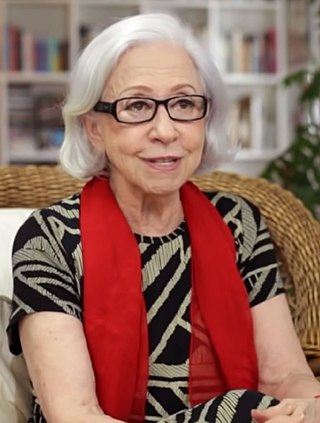
Arlette Pinheiro Esteves TorresONM, known by her stage name Fernanda Montenegro, is a Brazilian stage, television and film actress. Considered by many the greatest Brazilian actress of all time, she is often referred to as the grande dame of Brazilian theater, cinema, and performing arts. For her work in Central Station (1998), she became the first, and to date the only, Brazilian nominated for the Academy Award for Best Actress, as well as the first and only actress nominated for an Academy Award for a performance in a Portuguese language film. In addition, she was the first Brazilian to win the International Emmy in the category of Best Actress for her performance in Sweet Mother (2013).
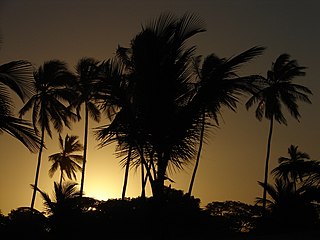
Ilhéus is a major city located in the southern coastal region of Bahia, Brazil, 211 km south of Salvador, the state's capital. The city was founded in 1534 as Vila de São Jorge dos Ilhéus and is known as one of the most important tourism centers of the northeast of Brazil.

Bangu Atlético Clube, commonly known as Bangu, is a Brazilian professional association football club based in Rio de Janeiro, in the western neighbourhood of Bangu. The team plays in Série D, the fourth tier of the Brazilian football league system, as well as in the Campeonato Carioca, the top tier of the Rio de Janeiro state football league.
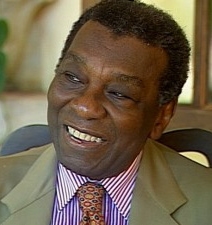
Milton Almeida dos Santos was a Brazilian geographer and geography scholar who had a degree in law. He became known for his pioneering works in several branches of geography, notably urban development in developing countries. He is considered the father of critical geography in Brazil. Santos was a recipient of the Vautrin Lud Prize, often seen as geography's equivalent of the Nobel Prize, and a posthumous recipient of the Anísio Teixeira Award, given every five years by CAPES to distinguished contributors to research and development in the country.

São Paulo State University is a public university run by the state government of São Paulo, Brazil.
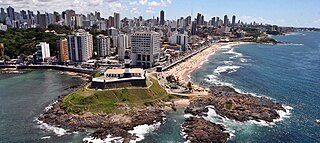
Salvador is a Brazilian municipality and capital city of the state of Bahia. Situated in the Zona da Mata in the Northeast Region of Brazil, Salvador is recognized throughout the country and internationally for its cuisine, music, and architecture. The African influence in many cultural aspects of the city makes it a center of Afro-Brazilian culture. As the first capital of Colonial Brazil, the city is one of the oldest in the Americas. Its foundation in 1549 by Tomé de Sousa took place on account of the implementation of the General Government of Brazil by the Portuguese Empire.

Ellen Gracie Northfleet is a Brazilian judge. She is the first woman to be appointed to the Supreme Court of Brazil and the Court's first female president.

White Brazilians refers to Brazilian citizens who are considered or self-identify as "white", typically because of European or Levantine Asian ancestry.

Brazilian society is made up of a confluence of people of Indigenous, Portuguese, and African descent. Other major significant groups include Italians, Spaniards, Germans, Lebanese, and Japanese.

Andrew "Andrucha" Waddington is a Brazilian film director, producer, and screenwriter.

The Brazilian Patrianovist Imperial Action, Pátria-Nova, or simply Patrianovism, was a monarchist organization that was present in many Brazilian states and that expressed the nationalist ideals of the 1920s and 1930s. Idealized by Arlindo Veiga dos Santos, it sought to establish a new organic monarchy in Brazil based on traditionalist policies, unlike what the now-defunct Empire of Brazil, which the patrianovists saw as liberal.
Miss Brazil CNB 2019 was the 30th edition of the Miss Brazil CNB pageant and the 5th under CNB Miss Brazil, held at the Dall'Onder Grand Hotel in Bento Gonçalves, Brazil, on September 3, 2019.

Estrela-Guia is a Brazilian telenovela produced and broadcast by TV Globo. It premiered on 12 March 2001, replacing O Cravo e a Rosa, and ended on 15 June 2001, replaced by A Padroeira. The telenovela is written by Ana Maria Moretzsohn, with the collaboration of Daisy Chaves, Izabel de Oliveira, Fernando Rebello, and Patrícia Moretzsohn.
Miss Brazil 2005 was the 51st edition of the Miss Brazil pageant. It was held on 14 April 2005 at Copacabana Palace in Rio de Janeiro, Rio de Janeiro State, Brazil and was hosted by Nayla Micherif with Roger Gobeth, Juliana Silveira, Igor Cotrim, and Maria Carolina Ribeiro all as commentators. The Pre-Show was hosted by Astrid Fontenelle. Fabiane Niclotti of Rio Grande do Sul crowned her successor Carina Beduschi of Santa Catarina at the end of the event. Beduschi represented Brazil at the Miss Universe 2005 pageant. 1st Runner-Up, Patrícia Reginato of Paraná, represented Brazil at Miss World 2005 and 2nd Runner-Up, Ariane Colombo of Espírito Santo, represented the country at Miss International 2005.
Miss Brazil 2004 was the 50th edition of the Miss Brazil pageant. It was held on 15 April 2004 at Credicard Hall in São Paulo, São Paulo State, Brazil and was hosted by Nayla Micherif and Gustavo Gianetti with Thiago Mansur, Astrid Fontenelle, Fernando Scherer, Sabrina Parlatore, Luciana Curtis, and Isabella Fiorentino all as commentators. Gislaine Ferreira, who is originally from Minas Gerais but competed as Miss Tocantins, crowned her successor Fabiane Niclotti of Rio Grande do Sul at the end of the event. Niclotti represented Brazil at the Miss Universe 2004 pageant. 1st Runner-Up, Iara Coelho of Minas Gerais, represented Brazil at Miss World 2004 and 2nd Runner-Up, Grazi Massafera of Paraná, represented the country at Miss International 2004.
References
- ↑ http://carto.educ-br.fr/resultats/?search_region=0&search_type=0&search_formation=0&search_aire_geo=16&search_periode=0&search_domaine=0&search_professeur Brésilianistes en France – Liste – Cartographie des Études Lusophones
- ↑ http://michaelis.uol.com.br/busca?id=lXKa Dicionário Michaelis
- ↑ Massi, Fernanda and Heloisa Pontes. 1992. Guia Bibliografico dos Brasilianistas. Editora Sumare.